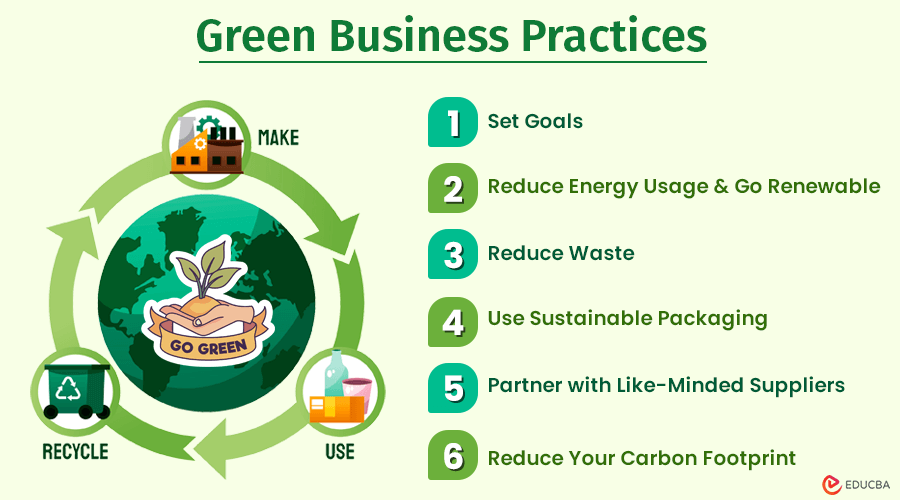
What are Green Business Practices?
A Green Business is a company that operates in an environmentally friendly way by using energy-efficient equipment, minimizing waste, recycling materials, and choosing sustainable resources. These green business practices are important and help in many ways. Businesses going green is one of the main things that will help us reach our sustainability targets, so here are some green business practices you can do to improve your business’s reputation and attract customers who value sustainability.
Top 6 Green Business Practices
Here are some easy green business practices to help you get started:
#1: Set Goals
The main reason for going green is to do the right thing for the environment, but there are many other benefits, too. Being environmentally friendly boosts your business’s reputation as a responsible, sustainability-focused company in the eyes of consumers, shareholders, and employees. Some small business owners mistakenly believe going green will slow their business growth. However, in many cases, it drives innovation, helping you create unique products and services that appeal to customers with different values.
While switching to renewable energy might seem expensive initially, some changes can save you money in the long run. For example, reducing the need for goods to be transported by buying locally or improving storage solutions can also lead to short-term cost savings.
#2: Reduce Energy Usage and Go Renewable
Start by reducing energy usage and switching to renewable energy sources to make your business more environmentally friendly. First, understand how much energy your business uses. You can do this by checking your smart meter, which most UK energy suppliers now offer. It will help you see where to make changes to reduce energy use. Also, ensure your business has an up-to-date Energy Performance Certificate (EPC), which will tell you how energy-efficient your premises are and suggest ways to improve.
The biggest energy users in any business are usually lighting, heating, and electrical appliances. If your building has many windows, use natural light and be mindful of unnecessary lighting. Consider upgrading to more energy-efficient lighting like LED units. Installing timers on your lighting and heating systems can prevent wasting energy when no one is around. You can also fit sensors to turn off lights automatically when a room is empty. Switching from desktop computers to laptops can save energy; small actions like unplugging chargers when not in use can make a big difference.
Switching to green energy providers is an easy and useful way to reduce your carbon footprint. You could install solar panels, wind turbines, or geothermal systems for an even bigger impact. Although these might cost a lot upfront, they can provide your business with free and renewable energy for years, leading to significant long-term savings. Many experts, including Martin Lewis on Octopus Energy, have praised the company’s competitive pricing and commitment to sustainability, making it a solid choice for businesses looking to switch to greener energy sources.
#3: Reduce Waste
Reducing waste is a key part of making your business more eco-friendly, no matter how big or small your company is. It is a simple process that anyone can do. For example, setting up separate bins for paper, plastic, and glass/metal to simplify recycling is a straightforward step toward better waste management.
Do not forget about electronic waste, which is a significant issue. Much e-waste comes from old computers and tech equipment. To handle this responsibly, use specialized recycling companies that ensure your old tech is disposed of properly and does not harm the environment. Alternatively, consider donating old computers to local charities that help needy families. This way, you reduce waste and support a good cause.
#4: Use Sustainable Packaging
To make your business more eco-friendly, consider using sustainable packaging. Many options are available, like biodegradable packing peanuts, cornstarch-based materials, and recycled paper or cardboard. One key focus is choosing the right size for your packaging. Using just enough packaging—without excess—helps reduce waste and is a great starting point for a more sustainable approach.
#5: Partner with Like-Minded Suppliers
Partnering with local suppliers can make your business greener and more efficient. By buying from nearby businesses, you reduce the distance your products need to travel, reducing pollution from transportation. Working with local companies can help you discover the perfect products or solutions you need and support your local community. It is a win-win: lower environmental impact, boost your brand and contribute to local economic growth.
#6: Reduce Your Carbon Footprint
To make your business more eco-friendly and help the UK reach net zero carbon emissions, begin by measuring your carbon footprint. It not only guides you on how much you need to reduce your emissions to hit the net zero target but also helps you develop a more effective environmental strategy.
Here are some ways to cut your carbon footprint:
- Use Local Suppliers: Buy from nearby businesses to reduce transport emissions.
- Reduce Travel: Reduce unnecessary trips to save on fuel and emissions.
- Switch to Renewable Energy: Use solar or wind to power your business.
Once you take these steps, consider offsetting any remaining emissions. One way to do this is by supporting a sustainable reforestation project in the UK or abroad. It can help balance out the emissions you still have and make your business more carbon-neutral.
Final Thoughts
Adopting these green practices will help the environment and make your business stand out as a leader in sustainability. Begin with small changes, monitor your progress, and keep finding ways to do better. Each step you take towards being greener helps create a healthier planet.
Recommended Articles
We hope this guide to green business practices has been insightful. Explore these articles to learn more about sustainable business strategies.

